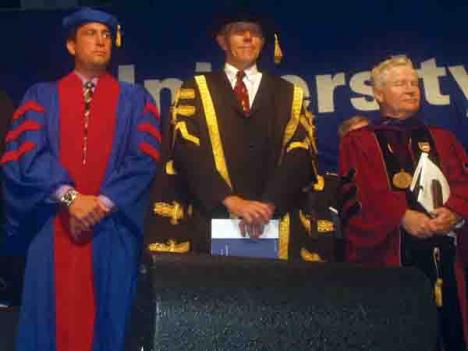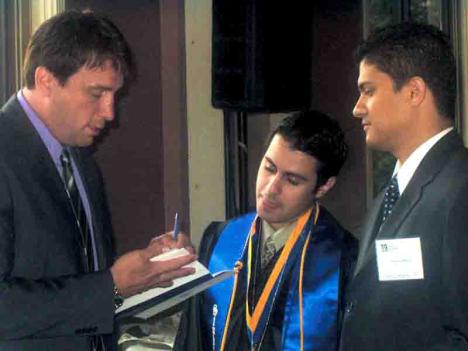Teacher Evaluations Priority for Senate President
May 28, 2003
In the student senate president’s office, there sits a couch, to your right as you walk in. It’s a very old, gray couch, with stains, bad odor, a thriving bacterial civilization, and no doubt some “undiscovered viral strains,” as some joke.
Within the first few days of ascending to the office of president, after the former one stepped down, then-Vice President Tuan Pham draped a green sheet over it, spraying the area with disinfectant and odor repellent. Plans are in the works to get rid of the old couch entirely, and replace it with a leather one.
The change has not entirely been cosmetic. Transparency and student outreach appear to be the watchwords for this presidency. The president’s door that looks out to the hallway is open more often, and Pham can be reached on AOL Instant Messenger via the name UMBSGAPresident. Taking a page out of Chancellor Jo Ann Gora’s book, Pham has set up student luncheons to discuss administrative problems with the university.
Having won the presidency by a mere two votes against Student Senator and former student trustee candidate Fritz Hyppolite (who then went on to win the vice presidency), Pham has set about planning for the next semester.
In a short online interview, Pham outlined his goals, the first being “to serve the student body,” and strengthen the structure of the senate, which was weakened by months of political backbiting and bickering. Another objective is to work with senators on a “daily routine” of finding out the business of the Statehouse that affects UMass. “Aside from the University’s effort in lobbying the lawmakers, we need to do the same. We need to be scheduling appointments and meeting with our state representatives to see what they’re doing for us and also to see what we can do to help,” he said.
On the top of Pham’s agenda is obtaining and publishing teacher evaluation results, something which he says he’s “furiously passionate” about.
“Ultimately, I think publicizing teacher evaluations will improve teaching on campus and showcase the already high teaching-quality [sic] we have,” he said, and cited a talk he had with an assistant dean at SUNY-Buffalo, who reportedly told him as much. “Students pay to attend UMB. They have the right in all sense to know how a professor/course is ranked before taking a course. The final decision lies upon them to take the course or not, but if the information is available then they should have access to it.”
When asked about other initiatives, like the issue of a campus ombudsperson, left over from last semester and never taken up again since then, Pham responded, “Teacher evaluations is first on my priority list. Radio station is second. And ombudsperson is something that still needs further analysis – if it is a student senate initiative, then we should pay for the possibly required higher-level analysis from consultants that would help us to decide on this matter.”
Speaking on the former president Joseph Panciotti, who left due to academic reasons, Pham stated, “The former President did not formally outline any policy, so I am not sure if he had any or if I can even comment on that.
“The better half of my predecessor’s terms was marked by debates on the ombudsman issues and strong characteristic differences of several senate members,” he said, likely referring to former Senator J. Stone Laraway. At the end of the fall semester, Pham had led the charge for a vote of no confidence against him, contending that Senator Laraway “was quick to point out mistakes of the Student Senate” and then would expose those mistakes to The Mass Media, making the student senate focus more on damage control than policy. “What the Senator is not quick to do is help the Senate fix its mistakes where appropriate and promote progression among the organization and the University. The effect has been many negative articles about the Student Senate in The Mass Media and resentment from many students towards the Senate,” Pham wrote. Pham and Laraway, who left in early spring due to academic reasons, have since made amends.
Pham has often criticized The Mass Media as well, at one time calling one article “irresponsible journalism.”
“All in all, it was a turbulent time,” said Pham, of the past semester. “But we have a lot of returning members and I know [we] can get the job done.”






















































